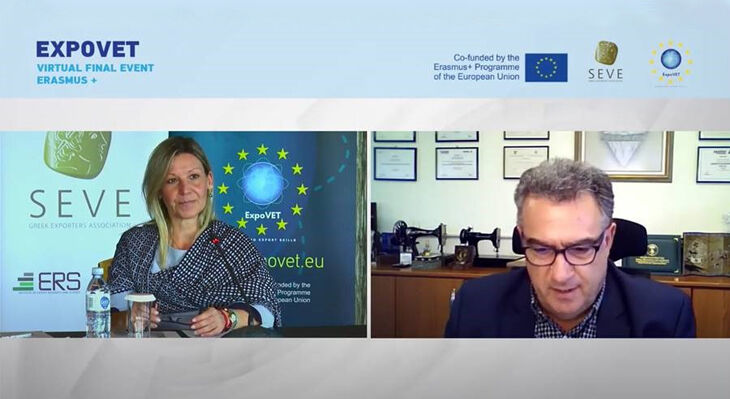Erasmus+ Project EXPOVET - European Joint Further Qualification for Export Experts
20.04.2021
The European Erasmus+ project ‚Export Expert’ held its final hybrid forum on 26 March 2021. Three universities (Aristoteles University of Thessaloniki, Greece; University of National and World Economy, Bulgaria and the Bucharest University of Economic Studies, Romania) join forces with the Greek Exporters Association, the Association of Economic Universities of South - East Europe & Black Sea Area, EURICON Consultants and Federal Institute for Vocational Education and Training (Germany) since 2019.

The project partnership develops a further qualification programme at level 6 of the European Qualification Framework. As stated by Mr Simon Diamantidis (Treasurer of Greek Exporters Association, SEVE), “companies and especially small and medium sized ones have competitive products, however they lack of support and expertise in internationalising their businesses and exporting their products and services. Entrepreneurship skills are crucial, thus addressing the challenges of the 4th industrial revolution and the ongoing digitalisation. The European Erasmus+ EXPOVET project addresses in a timely way this gap. It also strengthens the cooperation between universities, vocational education and training and companies”. The higher speed of innovation cycles and the urgency to take up new learning and training needs, especially in post-Covid times, make qualification offers such as EXPOVET much relevant so Mr Loukas Zahilas (CEDEFOP).
The EXPOVET qualification offer targets skilled professionals, aims at improving their knowledge, skills and competences, and enable them to set up or carry out export activities. The EXPOVET qualification was elaborated by analysing existing further training qualifications in the higher education and vocational education and training sectors in the four countries of the project, skills need by companies in Greece, Romania and Bulgaria as well as an analysis of the expectations of potential learners.
The speed of changes, increasing digitalisation and the international business networking make continuous further training for export a must. Many SMEs run export based on learning by doing. Meanwhile intercultural competences, international marketing and market research as well as data analytics (behavioural analysis, sales analysis based on consumer’s profile) for instance are evidently identified as skills in need. Interestingly the analysis also brought to the shore differences in the relative importance of marketing, data analytics or sales management across the three countries. Students and potential learners of EXPOVET emphasized the need for intercultural competences (including language skills and business culture). Comparing the analysed skills needs across the three countries and existing VET regulations in the four countries, the Export Expert Profile builds up around four main areas of activities clustered in a strategic and an operative level (see tables).
| Strategic Level |
|---|
| Develop, carry out and implement international marketing, including international market observation & research |
| Implement international business management and secure risk and change management |
| Operative Level |
|---|
| Transact foreign trade and to cater to international markets |
| Use foreign language skills and intercultural competences in terms of international communication |
Using the learning outcomes approach and the alignment of the qualification to the European Qualification Framework, requirements in terms of credit awards based on ECVET and ECTS as well as the European Quality Framework (EQAVET), the EXPOVET project defined an Export Expert Course.
Timeframe of the Export Expert Course
| Areas of Activity | Hours | Work-based learning |
|---|---|---|
| Develop, carry out and implement international marketing, including international market observation & research | 150 | 26,7% |
| Implement international business management and secure risk and change management | 150 | 26,7% |
| Transact foreign trade and cater to international markets | 200 | 40% |
| Use international language skills and intercultural competences in terms of international communication | 100 | 80% |
| Total number of hours | 600 | 40% |
The EXPOVET joint qualification leads to multiple certificates that will be awarded by the universities or their affiliated centres for lifelong learning in accordance with the respective institutional and national regulations. The course incorporates companies as learning venues during the mobility phase abroad. This blended mobility phase can be physical or virtual. Learning in companies abroad is especially relevant to the specialisation of the course. A set of quality requirements adapted from those in place in apprenticeship leads the companies in implementing the workplace learning. The project partnership agreed to adopt EQAVET as fundament to its quality management. Further to mobility, the international dimension of the EXPOVET qualification means international students’ working groups, international business case studies and cooperation with the youth branch of the ASECU.
Last but not least, the EXPOVET partnership is sustained by a Memorandum of Understanding between the universities, their centres for lifelong learning and SEVE for a start. As stated by Prof. Grigoris Zarotiadis (Dean of Faculty of Economic and Political Science of the Aristoteles University of Thessaloniki, President of ASECU and EXPOVET Project Leader, Greece): "Completing the project EXPOVET was a great experience: working together with motivated specialists, great scientists and committed researchers, besides leading to a result that makes you proud, is highly rewarding. Within two years, a promising project proposal led to a significant output with great prospects for further implementation. In the next months, a joint, cross-national course will be provided to young professionals all over South, Eastern Europe and the Black Sea, whereby export experts will acquire the necessary knowledge and develop the relevant skills to contribute to the integration of local production in the wider, interregional socioeconomic environment."
The project EXPOVET (97839-EPP-1-2018-1-EL-EPPKA3-VET-JQ) is supported by ERASMUS+ as a KA3 – Joint Qualifications in Vocational Education and Training.